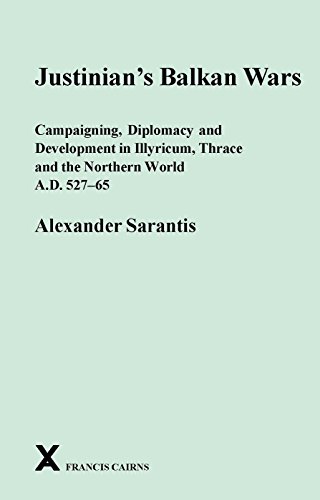


Books in series

The Bishops’ Synod
The First Synod of St Patrick: A Symposium with Text, Translation and Commentary
1976
Papers of the Liverpool Latin Seminar
Vol. 1, 1976
1977
Papers of the Liverpool Latin Seminar
Vol. 2, 1979
1979

Form and Universal in Aristotle
2007

Court and Poet
Selected Proceedings, Third Congress of the International Courtly Literature Society
1981

The Fragmentary Classicising Historians of the Later Roman Empire
Eunapius, Olympiodorus, Priscus and Malchus. Vol. I
1981
Medieval Latin Poetry and Prose
1981

Late Latin and Early Romance in Spain and Carolingian France
1982

Statius and the Silvae. Poets, Patrons and Epideixis in the Graeco-Roman World
1983

Papers of the Liverpool Latin Seminar, Vol 4, 1983
1984

A Historical Commentary on Sallust's Bellum Jugurthinum
1984

Sextus Aurelius Victor
A Historiographical Study
1984

Sheep-rearing and the wool trade in Italy during the Roman period
1984

Biblical Epic and Rhetorical Paraphrase in Late Antiquity
1985

The History of Menander the Guardsman. Introductory essay, text, translation and historiographical notes
1985

Bionis Smyrnaei Adonidis Epitaphium. Testo critico e commento
1985

Ovid
Amores: Volume I - Text and Prolegomena
1987

Herodotos and his `Sources'
Citation, invention and narrative art
1989

Masters of Roman Prose From Cato to Apuleius
Interpretative Studies
1989

A Lexicon of Ancient Latin Etymologies
1991

The Fifth-Century Chroniclers
Prosper, Hydatius and the Gallic Chronicle of 452
1990

Greek Philosophers and Sophists in the Fourth Century AD. Studies in Eunapius of Sardis
1990

East Roman Foreign Policy
formation and conduct from Diocletian to Anastasius
1992

Doctrine and Exegesis in Biblical Latin Poetry
1993
Roman Comedy, Augustan Poetry, Historiography
Roman comedy, Augustan poetry, historiography
1995

Augustus and the Principate
The Evolution of the System
1996

Ovid
Amores: Volume III - A Commentary on Book Two
1998

Rome and Persia at War, 502-532
1998

Vergil's Aeneid and the Argonautica of Apollonius Rhodius
2001

Ancient Etymologies in Ovid's Metamorphoses
A Commented Lexicon
2001

The Elegies of Tibullus
Being the Consolations of a Roman Lover, Done in English Verse
NaN

Jerome on Virginity
A Commentary on the Libellus de virginitate servanda (Letter 22)
2003

Anastasius I
Politics And Empire in the Late Roman World (Arca, Classical and Medieval Texts, Papers and Monographs)
2006

Bacchylides
Five Epinician Odes (3, 5, 9, 11, 13)
2010

Cult, Myth, and Occasion in Pindar’s Victory Odes
A Study of Isthmian 4, Pythian 5, Olympian 1, and Olympian 3
2014

Justinian's Balkan Wars
Campaigning, Diplomacy and Development in Illyricum, Thrace and the Northern World A.D. 527-65
1841
Authors



Publius Ovidius Naso (20 March 43 BCE – CE 17/18), known as Ovid (/ˈɒvɪd/) in the English-speaking world, was a Roman poet best known for the Metamorphoses, a 15-book continuous mythological narrative written in the meter of epic, and for collections of love poetry in elegiac couplets, especially the Amores ("Love Affairs") and Ars Amatoria ("Art of Love"). His poetry was much imitated during Late Antiquity and the Middle Ages, and greatly influenced Western art and literature. The Metamorphoses remains one of the most important sources of classical mythology. Ovid is traditionally ranked alongside Virgil and Horace, his older contemporaries, as one of the three canonic poets of Latin literature. He was the first major Roman poet to begin his career during the reign of Augustus, and the Imperial scholar Quintilian considered him the last of the Latin love elegists. He enjoyed enormous popularity, but in one of the mysteries of literary history he was sent by Augustus into exile in a remote province on the Black Sea, where he remained until his death. Ovid himself attributes his exile to carmen et error, "a poem and a mistake", but his discretion in discussing the causes has resulted in much speculation among scholars. Ovid's prolific poetry includes the Heroides, a collection of verse epistles written as by mythological heroines to the lovers who abandoned them; the Fasti, an incomplete six-book exploration of Roman religion with a calendar structure; and the Tristia and Epistulae ex Ponto, two collections of elegies in the form of complaining letters from his exile. His shorter works include the Remedia Amoris ("Cure for Love"), the curse-poem Ibis, and an advice poem on women's cosmetics. He wrote a lost tragedy, Medea, and mentions that some of his other works were adapted for staged performance. See also Ovide.
